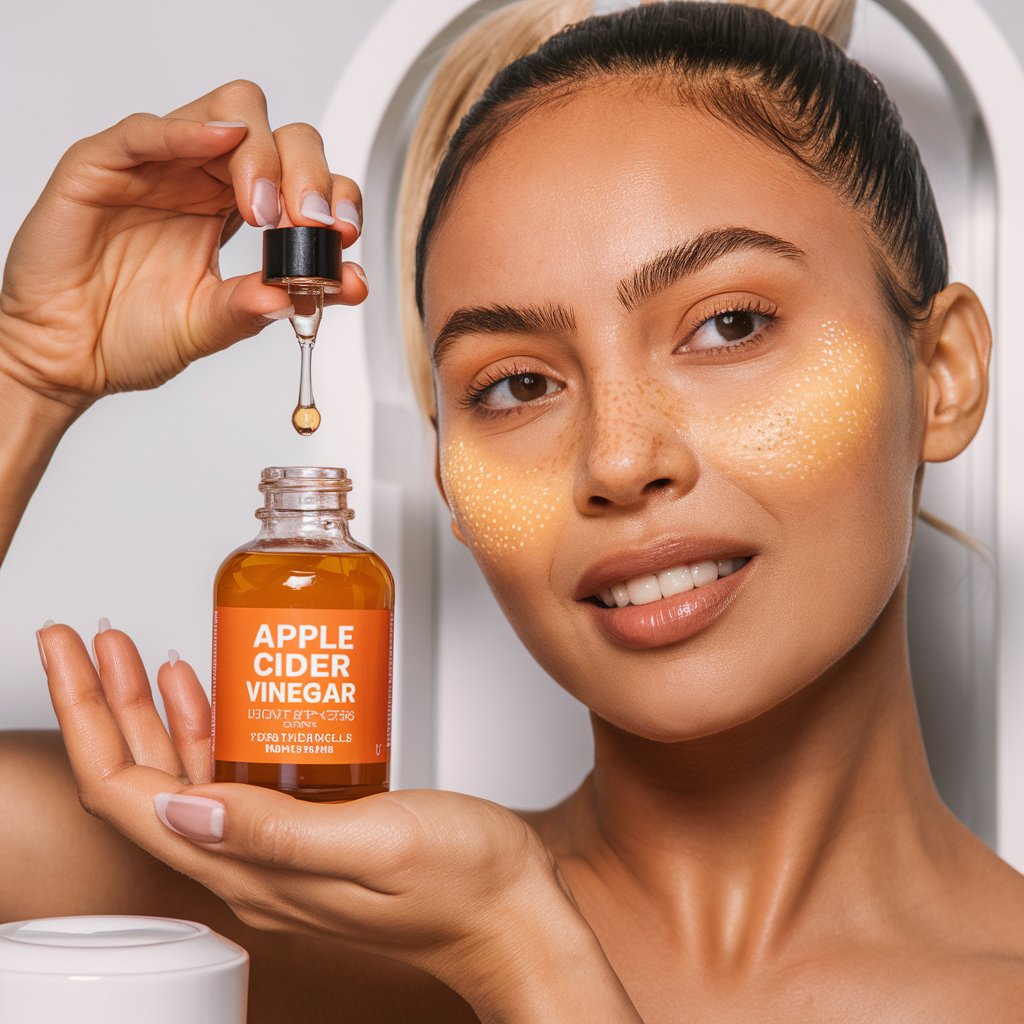At a glance: Apple cider vinegar is known for its ability to lighten dark spots and even out skin tone. This article delves into the benefits of apple cider vinegar, how to use it safely, and tips for integrating it into your skincare regimen for optimal results
Apple cider vinegar (ACV) has been touted as a versatile home remedy for various skin issues, including skin lightening.
Its purported benefits range from balancing skin pH to reducing hyperpigmentation.
However, you need to understand both the potential benefits and risks before incorporating ACV into your skincare routine.
Apple cider vinegar and skin whitening: What Dermatologists Say
Dermatologists have mixed opinions about using ACV for skin lightening.
Dr. Joshua Zeichner, a dermatologist at Mount Sinai Hospital, notes that ACV contains acetic acid, which has antibacterial properties.
It also contains malic acid, a gentle chemical exfoliant that can help balance the skin’s pH and improve hyperpigmentation by reducing melanin production[1].
Dr. Michele Green adds that malic acid’s exfoliating properties can unclog pores, reduce acne, and diminish the appearance of dark spots.
Potential Benefits
- Balances Skin pH: ACV’s acidic nature helps maintain the skin’s natural pH, potentially reducing oiliness and preventing acne.
- Exfoliates and Brightens: The malic acid in ACV acts similarly to alpha-hydroxy acids, gently exfoliating the skin and improving skin tone by reducing dark spots and hyperpigmentation.
- Antibacterial Properties: ACV’s antibacterial properties can help prevent acne by eliminating bacteria on the skin’s surface.
- Hydration and Skin Smoothness: When mixed with hydrating ingredients like honey, ACV can help improve skin texture and hydration.
How to Use ACV for Skin Lightening
- Toner: Dilute ACV with water (1:4 ratio) and use it as a toner. Apply with a cotton ball and leave it on for 15-20 minutes before rinsing off with water. This natural process can be part of your homemade beauty treatments routine.
- Face Mask: Combine ACV with honey or aloe vera for a hydrating and soothing mask. The acetic acid in ACV can help to balance the pH of your skin, reducing the appearance of pores and improving skin texture. Apply the mixture to your face, leave it on for 15-20 minutes, then rinse off with water.
- Exfoliating Scrub: Mix ACV with baking soda or sugar for a gentle exfoliating scrub. This helps remove dead skin cells and can brighten the skin over time, making it a great addition to your natural remedies routine.
Related: Natural Skin Lightening Ingredients You Never Knew Could Lighten Skin
User Experiences and Research
User opinions on skincare forums vary widely.
Some users report positive results, such as reduced acne and brighter complexion, after regular use of diluted ACV.
For example, one user shared, “After using an ACV toner for a few weeks, I noticed my skin tone became more even, and my dark spots faded significantly, which made me consider it as a potential acne treatment.”
However, others warn about the potential for irritation and burns, especially if ACV is not properly diluted.
One user cautioned, “I tried using ACV undiluted on a pimple, and it caused a painful burn. Be very careful with the concentration.”
Research on ACV’s efficacy for skin lightening is limited and largely anecdotal.
Some studies highlight the benefits of acetic and malic acids for skin health. Still, comprehensive clinical trials specifically on ACV for skin lightening are lacking.
- ACV contains malic acid, which may help decrease melanin production, potentially lightening brown spots and hyperpigmentation. The reduction of dark spots may occur due to its exfoliating properties ➋.
- SMG Herbals article explains the potential of ACV for skin whitening due to its exfoliating and antimicrobial properties . ➍.
- MedicalNewsToday article reviews the general benefits of ACV for face care, indicating there is little evidence to support its use for significant skin improvements, including lightening ➎.
DIY ACV Skin Lightening Recipes
Apple cider vinegar (ACV) can be a versatile addition to your skincare routine, especially for people looking to lighten their skin. Here are simple and safe recipes for topical use.
For optimal results, consider combining ACV with other natural ingredients that target hyperpigmentation treatment, such as turmeric or berries. Regular use of the recipes can lead to a noticeable dark spots reduction over time.
- Basic ACV Toner: Mix one part ACV with two parts water. Apply with a cotton ball to clean skin once daily. This helps to exfoliate dead skin cells and promote a brightening effects complexion.
- ACV and Lemon Juice Mask: Combine one tablespoon of ACV with one tablespoon of lemon juice and one tablespoon of honey. Apply the mixture to your face and leave it on for 15-20 minutes before rinsing off with warm water. .
- ACV and Baking Soda Scrub: Mix one teaspoon of ACV with two teaspoons of baking soda to form a paste. Gently scrub your face with this mixture for a couple of minutes, then rinse thoroughly. The scrub can help to reduce the appearance of acne scars and brighten the skin.
ACV Skin Lightening Routine
To incorporate ACV into your skincare routine effectively, consider the following:
- Frequency: Start by using ACV-based treatments once or twice a week to see how your skin reacts, and experience the natural skin care benefits. Gradually increase to daily use if no irritation occurs.
- Duration: Leave ACV-based masks on for 15-20 minutes before rinsing off. For toners, it can be left on until your next wash. Always follow up with a moisturizer to prevent dryness and maximize the skin care benefits.
- Incorporation Tips: ACV can be mixed with other organic skincare ingredients like honey, aloe vera, or green tea to enhance its benefits. Always use diluted ACV to avoid skin irritation【source】.
Safety and Precautions
Using ACV for skin lightening may have side effects.
Common side effects include skin irritation, redness, and a burning sensation.
To minimize the risks, prioritize organic skincare and follow the recommended usage guidelines.
- Patch Test: Before using any ACV-based product on your face, perform a patch test on a small area of your skin to ensure you’re not prone to skin pigmentation issues. .
- Dilution: Always dilute ACV with water or mix it with other ingredients to reduce its acidity and potential for irritation, which can hinder your journey to achieving clear skin.
Who Should Avoid Using ACV?
Not all skin types can tolerate ACV. Those with sensitive skin, eczema, or rosacea should avoid using ACV as it can exacerbate the conditions and make skin rejuvenation more challenging.
For individuals who cannot use ACV, alternatives like aloe vera, green tea, or vitamin C serums can be effective for skin lightening and are generally gentler on the skin.
Real-life Experiences
Many people have shared their experiences using ACV for skin lightening, which can help fade scars and hyperpigmentation.
Personal stories often highlight the gradual improvement in skin tone and the challenges faced, such as initial irritation or dryness. Before-and-after photos can provide visual proof of ACV’s effectiveness in achieving an even skin tone, though results may vary.
Frequently asked questions
Q: How long does it take to see results with ACV?
A: Results can vary, but some users report seeing a difference in their skin tone within a few weeks of consistent use, which can be a great motivator to try out various beauty remedies.
Q: Can ACV be used with other skincare products?
A: Yes, but it’s important to avoid combining it with other strong acids or retinoids to prevent irritation.
Summary of Key Points
- Apple cider vinegar could be an effective, natural option for skin brightening when used correctly.
- The key benefits include exfoliation and DIY skin brightening, with several simple recipes available for safe application.
- Beware of potential side effects, such as skin discoloration, and perform a patch test before full use.
Final Thoughts
While ACV can be a helpful addition to your skincare routine, especially when combined with homemade skin treatments, consult a dermatologist to ensure it’s suitable for your skin type. Safety should be a priority in any skincare regimen.

I’m a devoted organic skincare enthusiast, passionate about the natural, wholesome goodness that organic products bring to our skin.
Organic skincare isn’t just a hobby for me—it’s a lifestyle. Every product I use, recommend, and write about has been carefully chosen for its purity and effectiveness. Everything I write about is backed by scientific studies, dermatologists’ opinions, and user experiences.
I also excel at tackling skincare challenges with innovative, organic solutions.


